What I Buy and Why
Korean-American Tech Investor Jung Lee on Supporting Contemporary Asian Artists Through Innovative Means
The collector is developing a state-of-the-art robotic studio in the marble quarry town of Carrara, Italy.
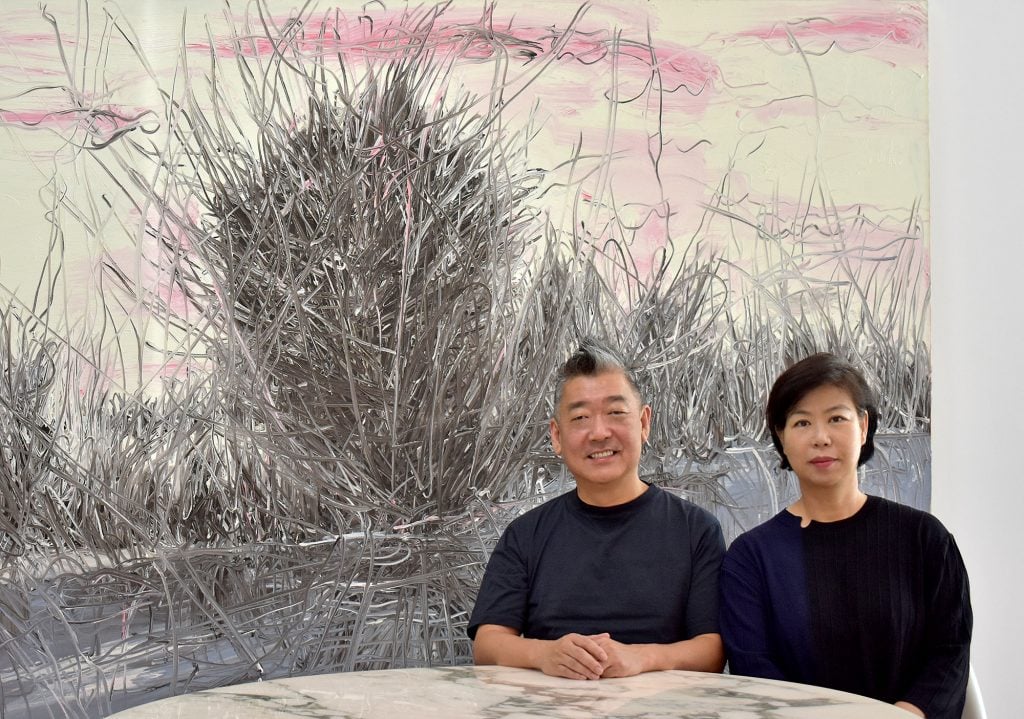
The collector is developing a state-of-the-art robotic studio in the marble quarry town of Carrara, Italy.

Cathy Fan

To what extent can an art collector’s journey lead to innovation? Korean-American tech investor Jung Lee illustrates that there exist unconventional avenues through which to elevate his passion for art and support for artists. A former banker and tech entrepreneur, Lee is soon to unveil his pioneering endeavor, TEN X—a state-of-the-art robotic digital studio located in the historic Italian marble quarry town of Carrara. Partnering with an Italian maker of milling technology, TEN X is poised, said Lee, to “educate, empower and support artists to realize their artistic visions.”
“Ten X embraces the Bauhaus ideals of uniting art, craft, and technology,” he explained, “and aims to harness creativity by integrating breakthrough digital robotic technology with the Italian tradition of stone craftsmanship.” The following video shows how a figure from Chinese artist Feng Mengbo’s imagination can be cut in stone without the need for human carving.
Lee and his wife, Jeeyoon Lim, began collecting contemporary Asian art over two decades ago. In 2012, the couple founded Rén Space, an experimental art space in Shanghai that provides funding and resources to prominent contemporary Chinese artists to expand their practice. Their ambition has now transcended the confines of China and Korea, encompassing artists from diverse origins as they empower creators through the deployment of cutting-edge tools.
When not in Asia or Italy for their art ventures, the couple finds peace in their Californian ranch house. A masterpiece of design and renovation by Lim, an architect, the dwelling bathes in sunlight, exuding a peaceful ambiance while showcasing an array of their cherished art pieces. We caught up with the couple for a recap of their collecting history.
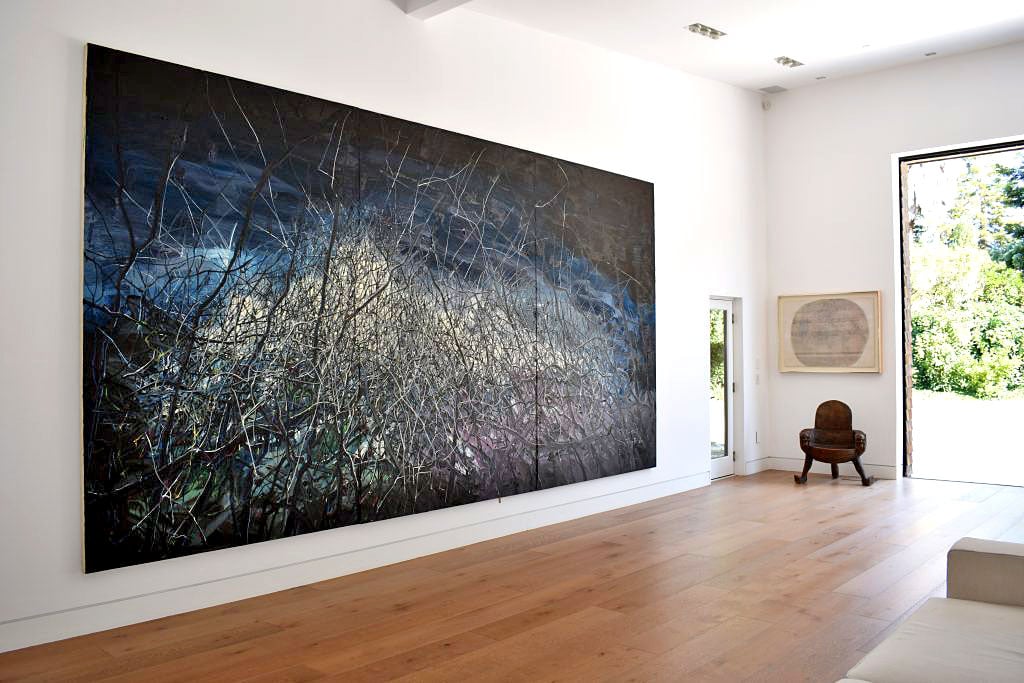
Left: Zeng Fanzhi, Untitled (2007). Right: Yu Youhan, Untitled (1986). Courtesy of the collectors.
What was your first purchase?
I bought this wooden self-portrait of a Guarani artist from a street in Asunción, Paraguay, in 1981. I was 14 and I remember marveling at the artist’s expansive, extended earlobes and thinking how cool they were. The price is still penned on the back: about three U.S. dollars. This small wooden sculpture continues to be one of my favorite pieces.
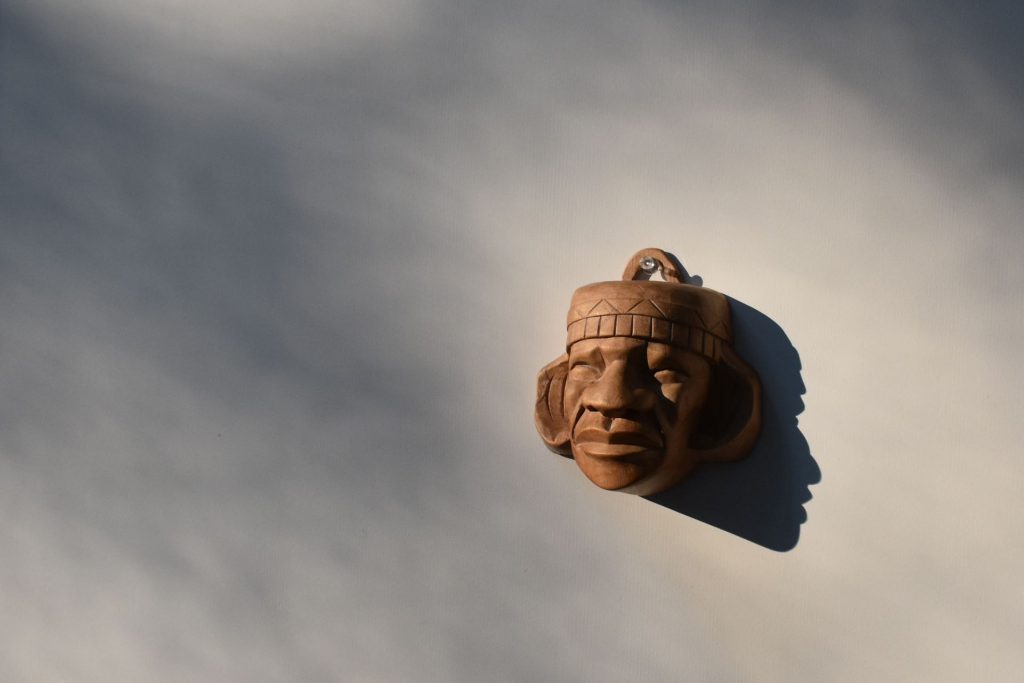
Wooden self-portrait of a Guarani artist from a street in Asunción, Paraguay, in 1981.
What was your most recent purchase?
A painting by Feng Mengbo from 2014, Chun Li dethroning Superman.
Tell us about a favorite work in your collection.
It changes depending on my mood. Recently, I find much joy and peace when staring at the two abstract circle paintings by Yu Youhan from 1985 and 1986 from my living room sofa.
Which works or artists are you hoping to add to your collection this year?
Li Binyuan.
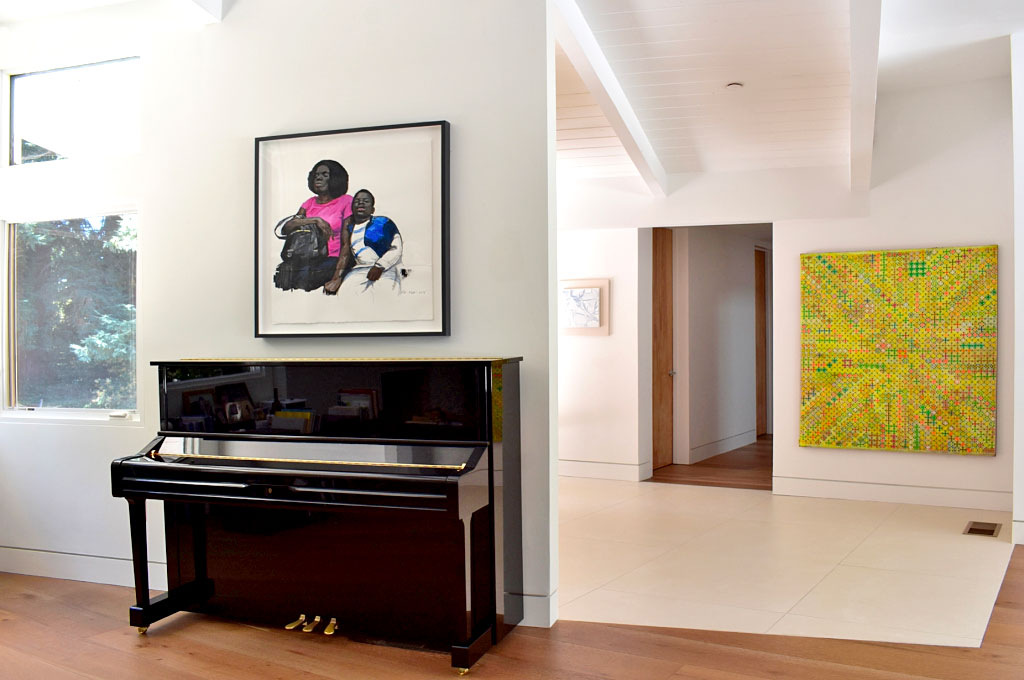
Left: Wang Xingwei’s painting above the piano. Right: Ding Yi’s Appearance of Crosses (2001). Courtesy of the collectors.
Please tell us a story behind one of the works you own.
Artist Wang Xingwei was on a subway in New York City visiting his son and took photos of riders. He painted one of them when he stayed at our home and left the painting for my daughter. The reason I really like this work is how Wang painted a dignified portrait of a Black mother and her son—a tired yet strong and dignified mother with her young son’s eyes closed.
What is the most valuable work of art that you own?
Each work we own carries different significance and memories embedded within our lives and cannot weigh its relative values.
Where do you buy art most frequently?
In recent years, mostly commissioned works from artists.
Is there a work you regret purchasing?
No. I’ve already sold them. I don’t do regrets.
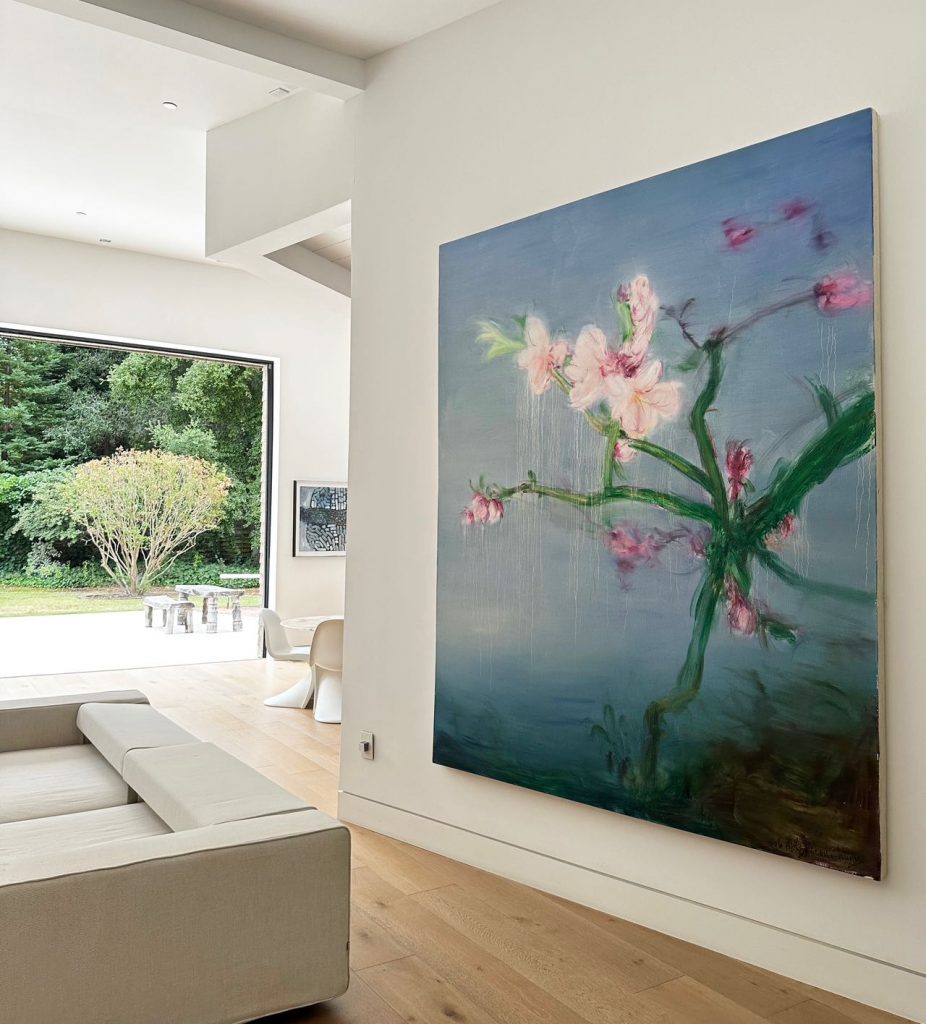
Hanging behind the sofa is Zhou Chunya’s Peach Blossom (2006). Courtesy of the collectors.
What work do you have hanging above your sofa? What about in your bathroom?
We have a 2006 piece from Zhou Chunya behind our living room sofa. Our youngest child liked the colors growing up. Zhang Enli’s Container hangs in the guest bathroom.
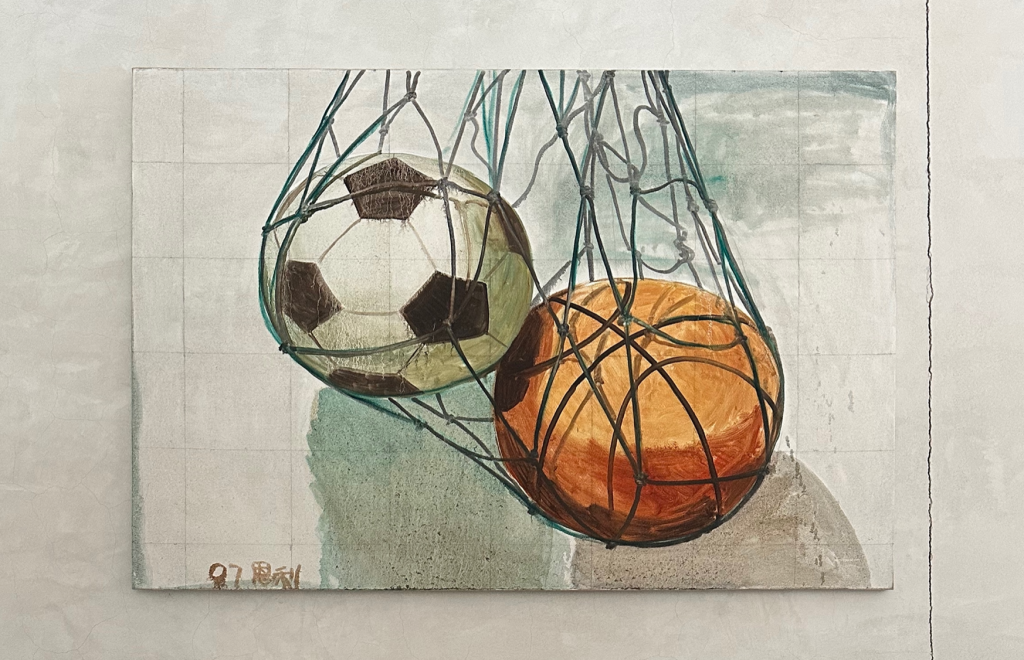
Zhang Enli, Football and Basketball (2007).
What is the most impractical work of art you own?
I have a scroll containing 23 abstract ink circles by Ding Yi from 2009. One circle starts as a small dot and grows into a larger circle that completely fills the page and then recedes to smaller circles. Each circle is unique, yet together, the shapes flow organically over a five-meter-long scroll. This work is distinctly influenced by the Chinese ink painting tradition in its subject, technique, and composition. Though the piece is calming and serene, it is difficult to handle and delicate to display. I don’t want to put it behind a glass box, so it is in storage for now.
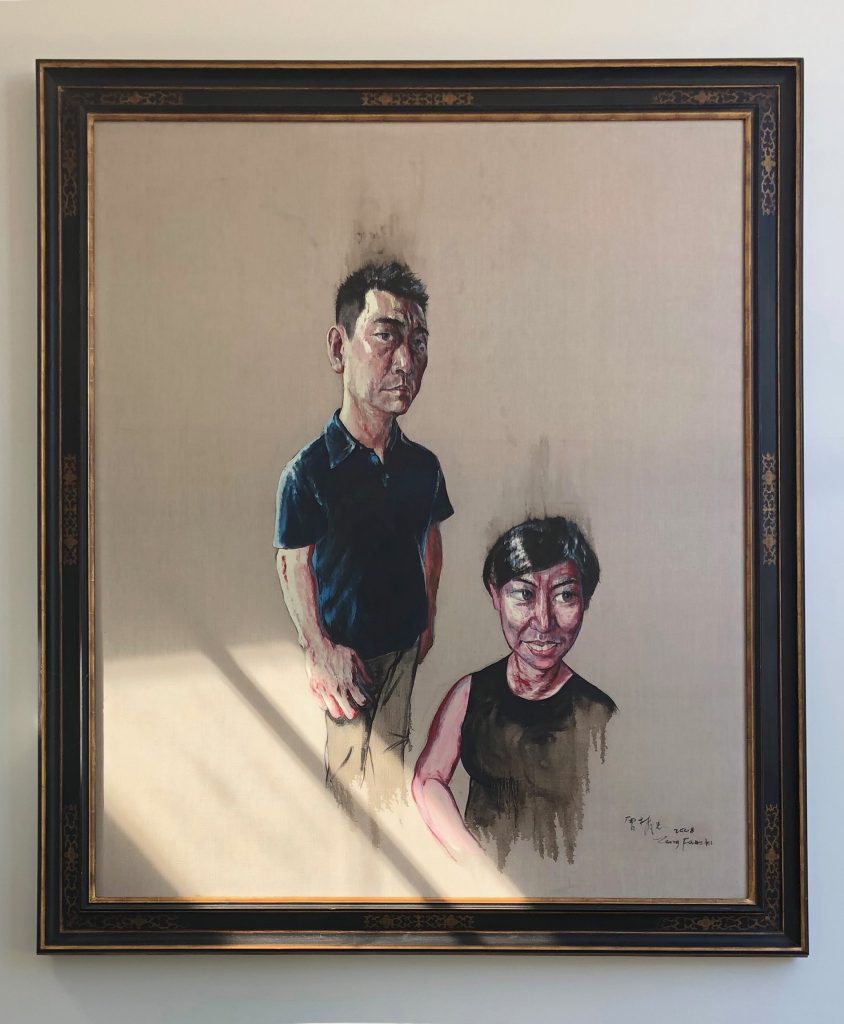
Artist Zeng Fanzhi’s rendering of Jung Lee and Jeeyoon Lim (2008).
What work do you wish you had bought when you had the chance?
Life is always full of choices and options. I feel very fortunate to have collected these wonderful pieces over the years and I look forward to seeing new fantastic works coming out of TEN X.
If you could steal one work of art without getting caught, what would it be?
Tempi Madonna (1508) by Raphael. My uncle brought a large glossy painting book from Rome for my mother in 1962. As one of the first group of Korean students to be sent to Rome in 1952, my uncle spent 10 years studying at Pontificia Università Urbaniana and became ordained as a Catholic priest in Rome before coming back to Korea. My mom kept this book at home and I grew up favoring the warm embrace of the mother in Tempi Madonna amongst the foreign, provocative, and scary images of religious Renaissance Italian paintings. This image is now inextricably linked to my memory of my mother. Last year at London’s National Gallery, I stood in front of the Tempi Madonna recalling this book from my uncle and the happiest memories of my childhood. All was well.
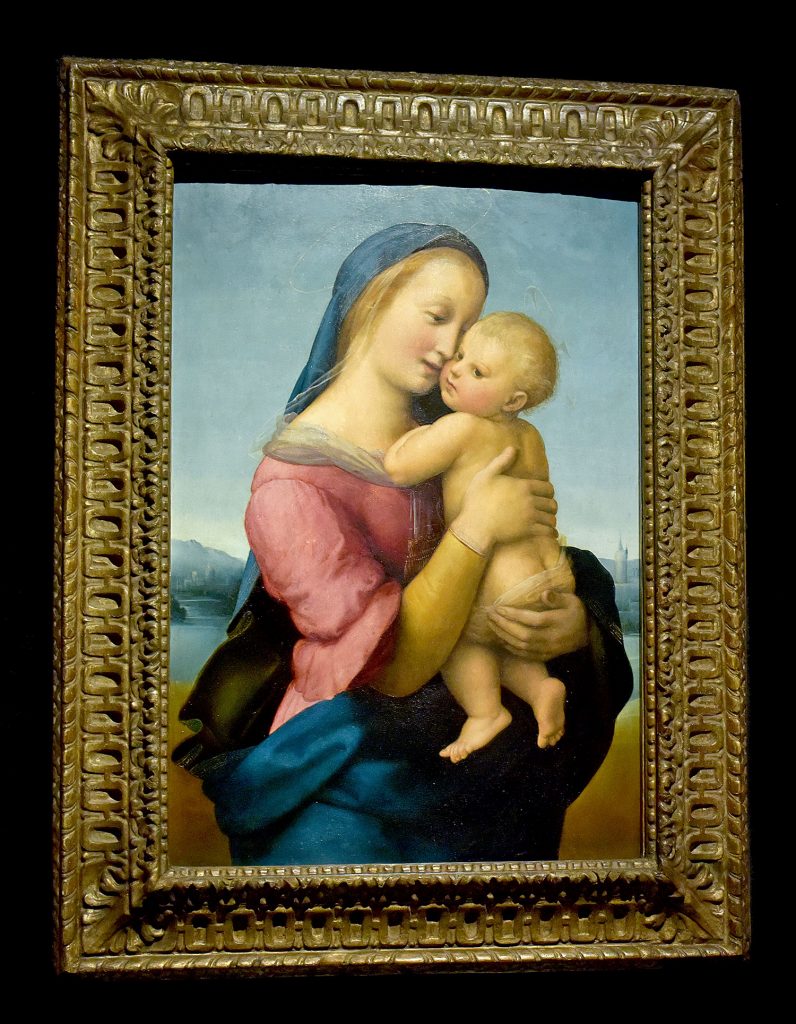
Raphael, Tempi Madonna (1508), at the Scuderie del Quirinale in Rome, Italy, in 2020. (Photo by Simona Granati – Corbis/Getty Images)